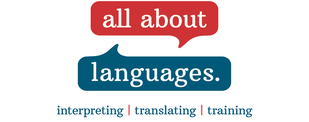|
By Patricia Jaworski The Challenges Interpreters Face Interpreting is one of the main components of language services, but with that comes many challenges. Whether the interpreting is done over the phone, via video or in-person and if it’s for healthcare, business, or legal purposes, new and experienced interpreters are likely to face many challenges every once in a while. Difficulty Hearing the Speaker This is one of the most cumbersome challenges and the situation can develop from only two things. One, which can be fixed- the audio equipment is not working properly, and two, a problem with the individual speaker. While audio malfunctions can easily be rectified, a problem with the individual speaker cannot be fixed right away. These problems can be –
Cultural Awareness Being an interpreter is very demanding. Aside from having a high level of proficiency in the source and target languages, they must be highly knowledgeable of the culture of different countries. You might be knowledgeable, but what if your speaker does not know the language they are speaking in, that well? Or, they know it but are not pronouncing words correctly or the way you studied? While this may occur more often that it should, the interpreter has to know the differences in how the language is spoken by people from different regions. Speakers will often use local idioms, slang and jargon, so it is very important for an interpreter to be aware of these otherwise the job will not be done effectively. Interpreters rely not only in their excellent language proficiency but also in their vast knowledge of a different cultures, the cultural connotations of the words spoken, and how the language is expressed in a different culture. if an interpreter is not entirely knowledgeable in the language, culture or different slangs they should not be interpreting for that specific job. Interpreters act as a conduit for intercultural communications. It is important to not only interpret the words, but to deliver the source language in the tone of voice that reflects how it sounds in the target language and transfer the intended meaning of the message. It is challenging, but interpreters must be quite flexible yet quick in making decisions right on the spot. What type of interpreting is it? This can play a huge factor when interpreting. Whether it is Video Remote Interpreting, or in-person, it is important to know what to do when interpreting in that specific industry. When working in healthcare, the interpreters must be knowledgeable, somewhat on the topic. For legal assignments, do not change anything as this can lead to many issues. Conclusion Interpreters must come to the conclusion themselves if they can or cannot do their job effectively. As part of the Code of Ethics of the Australian Institute of Interpreters and Translators (AUSIT) the principle around competence stresses this rule. If you cannot hear the speaker, understand the language they are speaking in, or know what to do in a certain industry situation you will not be able to interpret successfully.
5 Comments
MEHRANGIZ MODARRES TABATABAEI
19/8/2020 09:58:36 pm
I have encountered many challenges during my professional practices. One of the challenges I often experience is in the Health sector, where the level of communications (nuances and complexities) between the patients and professionals are significantly different, which is hard to convey the accurate message. In Audio interpreting, and in particular, in dental session, the background noise is very much interfering and makes the quality of sound low. Specially when patient, doctor and assistant all speak at the same time.
Reply
Hsieh Fei Chen
20/8/2020 09:18:46 am
As an Interpreter, the challenge we could be facing sometimes, is that we would be asked to translate the clients documents while interpreting, particularly in a medical envelopment.
Reply
Cathy Tan
20/8/2020 02:32:49 pm
The biggest challenge as an interpreter for me is to learn medical professional vocabulary. It is well know that medical terminology is not easy to remember , but my major interpretation field is in the hospital . That is to say , I must overcome it. When I accept a job every time , I will focus on reading the related medical knowledge and recite some medical terminology about it . When I heard them on the interpreting site , I could translate them accurately for the patient. Of course , the doctors's accents also affect the interpreting sometimes . However , I believe we can do well if we like this job. Only if we devote enough time and energy , we can overcome any difficuty in interpreting .
Reply
Jo Ann McGregor
21/8/2020 08:39:31 am
Knowing the majority of the interpreting jobs are with doctors or other medical and health professionals, medical jargon is one of the challenges I commonly face. I have to ask the healthcare professional to use 'comprehendable' term to me so that it makes it easier for the client to understand when I'm doing the interpretation.
Reply
Veronique Tabor
22/8/2020 06:19:53 pm
I mostly work at the hospital in all departments. If I know what it is going to be about, I usually prepare myself. The challenge I face is when the patient's family is in the room and answer the questions before I even open my mouth. They usually don't wait for their sibling's answers. They don't really interpret, they just talk for them!
Reply
Leave a Reply. |
Archives
May 2021
|
hours24 hours | 365 days
|
telephone03 6344 7831
|
|


 RSS Feed
RSS Feed

